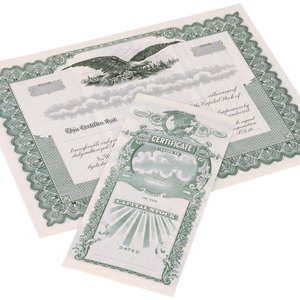
The basis, or cost basis, of a stock investment is the amount initially invested in the shares. If the shares are inherited, the heir gets a new basis -- the value of the stock at the time of the deceased owner's death. If the original owner had a large gain in the stock, the revised basis keeps the heir from having a large capital gain tax bill if the shares are sold. Someone inheriting stock should determine the cost basis of the shares as soon as possible after receiving the stock and maintain a record of the basis.
Look up the stock's price on the date of the previous owner's death. Your cost basis in most circumstances is the value of the stock on the date of death. Stock price history can be found by looking up the stock symbol on Yahoo Finance and Google Finance and selecting "Historical Prices" in the left menu bar.
Compute the average stock price on the selected date by adding together the opening price plus the closing price and dividing by two. If the date of death was on a weekend, average the share prices, opening and closing for Friday and Monday. The result is your cost basis share price.
Check the investor relations page of the company website for any stock splits since the date of death or since you received the shares. If a split has occurred, adjust your basis number of shares by the stock split ratio. For example, if a 2 for 1 split has occurred, you now have 400 shares if you originally would have had 200.
Multiply the basis date share price times the basis date number of shares to calculate the cost basis of your inherited shares.
Tips
If the stock has split, it is easily determined by viewing the historical stock prices on sites such as Google Finance and Yahoo Finance. Google gives a split-adjusted share price, and Yahoo shows the actual daily share price. If your inherited stock came from an estate large enough to pay estate tax, the executor of the estate may have selected an alternate valuation date for the share price for the estate tax return. If the executor used the alternate date, you must also. Obtain a copy of the IRS Form 8939 from the executor to determine the basis date of your shares.
References
Tips
- If the stock has split, it is easily determined by viewing the historical stock prices on sites such as Google Finance and Yahoo Finance. Google gives a split-adjusted share price, and Yahoo shows the actual daily share price.
- If your inherited stock came from an estate large enough to pay estate tax, the executor of the estate may have selected an alternate valuation date for the share price for the estate tax return. If the executor used the alternate date, you must also. Obtain a copy of the IRS Form 8939 from the executor to determine the basis date of your shares.
Writer Bio
Tim Plaehn has been writing financial, investment and trading articles and blogs since 2007. His work has appeared online at Seeking Alpha, Marketwatch.com and various other websites. Plaehn has a bachelor's degree in mathematics from the U.S. Air Force Academy.

